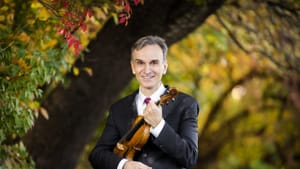Stay in the Loop
BSR publishes on a weekly schedule, with an email newsletter every Wednesday and Thursday morning. There’s no paywall, and subscribing is always free.
Seasons of love
The Philadelphia Orchestra presents Gil Shaham playing Vivaldi's Four Seasons

Verizon Hall might not have any windows, but an audience member this past weekend could practically feel the sun dappling the Kimmel Cultural Campus as the Philadelphia Orchestra performed Vivaldi’s Four Seasons. As played by guest soloist Gil Shaham and members of the string sections, the ebullient opening celebration of spring seemed like a perfect way to spend a bright, warm Friday afternoon, even if it meant remaining indoors for a few hours.
Although the four concerti that comprise the unified 40-minute work have been around for nearly 300 years, they’ve reached iconic pop-cultural status in the past few decades, serving as the background music for countless movie scenes and television commercials. The average listener could probably hum the entirety of the Spring concerto’s Allegro without even knowing where it comes from. This familiarity introduces a challenge for interpreters: how do you find something new to say with a piece that is so familiar—and is so often heard outside of its original context?
What the Philadelphians do best
Many outfits within the historically informed performance movement have solved the problem by reintroducing the work on period-specific instruments or employing self-consciously fast tempos. This has the benefit of adding a sense of immediacy to music that can otherwise sound rather staid. But it’s also not what the Philadelphia Orchestra does, and in the past, their attempts to adopt this style have come across as underpowered (or even wimpy).
Thankfully, they didn’t try here. The musicians leaned into what they do best, and they were guided by Shaham, who served as a de facto leader for the conductor-less program. Shaham’s richly toned solo lines often sailed above the seamlessly blended orchestral forces; elsewhere, he engaged in playful duets with violinist David Kim, violist Kerri Ryan, and cellist Hai-Ye Ni.
The ensemble wonderfully painted the images embedded in the music, from the wildly unpredictable weather depicted in Summer to the tense, descending gloom of the concluding Winter. A lackluster performance of this cycle can feel like it takes an entire year to experience—here, it flew by like no time had passed.
This was the second Philadelphia Orchestra concert this season to feature an estimable soloist as “leader” rather than a traditional conductor. In November, Joshua Bell tried his hand at conducting in earnest, pacing a solid but uninspired reading of Mendelssohn’s Italian Symphony after performing the solo part in Bruch’s Violin Concerto. Shaham, in contrast, remained in his comfort zone. He didn’t so much conduct as encourage, bopping his head and shooting beaming glances of approval to his colleagues. Occasionally, he offered the subtlest gesture to adjust dynamics or suggest a different interpretive direction. More often than not, he got the results he wanted.
Kreisler and the Chevalier
Perhaps the concert’s great discovery was the Violin Concerto in G Major of Joseph Boulogne, Chevalier de Saint-Georges. The composer—the son of an enslaved Caribbean woman and a French plantation owner—was known in his own time as a virtuoso musician, and his works have recently reentered the concert repertory. Shaham brought the stamp of a prodigy to the finger-bruising first movement, delivering sustained high notes that never turned squally. The minor-key slow movement avoided lachrymosity while still sounding appropriately contemplative, and the concluding Rondeau was a spirited country dance.
The program also featured Fritz Kreisler’s brief Praeldium and Allegro, which comes across more as an endurance test than an enjoyable piece of music. Shaham dispatched the tricky leaps and runs with ease, but, understandably, he didn’t appear to be having much fun while doing it. This is the kind of music where one slip can crater the entire enterprise. Personally, I got more out of watching and hearing the orchestra in this section—especially when the violins sustained a single note with phenomenal control for what felt like forever.
When it comes to string tone and texture, the Philadelphians have long been the best in the business. Shaham might have been the draw for these performances, and rightfully so, but the orchestra rank and file were a coequal star.
What, When, Where
The Four Seasons. Led by Gil Shaham, violin. The Philadelphia Orchestra. $10-$159. April 28-30, 2022, at the Kimmel Cultural Campus's Verizon Hall, 300 S. Broad Street, Philadelphia. (215) 893-1999 or philorch.org.
The Kimmel Cultural Campus requires all patrons aged five years or older to be fully vaccinated against Covid-19. Masks are required at all times inside the concert hall. Seating is not distanced.
Accessibility
The Kimmel Cultural Campus is an ADA-compliant venue. Patrons can purchase wheelchair seating or loose chairs online by calling Patron Services at (215) 893-1999, or by emailing [email protected]. With advance notice, Patron Services can provide options for personal care attendants, American Sign Language, Braille tickets and programs, audio descriptions, and other services.
Sign up for our newsletter
All of the week's new articles, all in one place. Sign up for the free weekly BSR newsletters, and don't miss a conversation.

 Cameron Kelsall
Cameron Kelsall